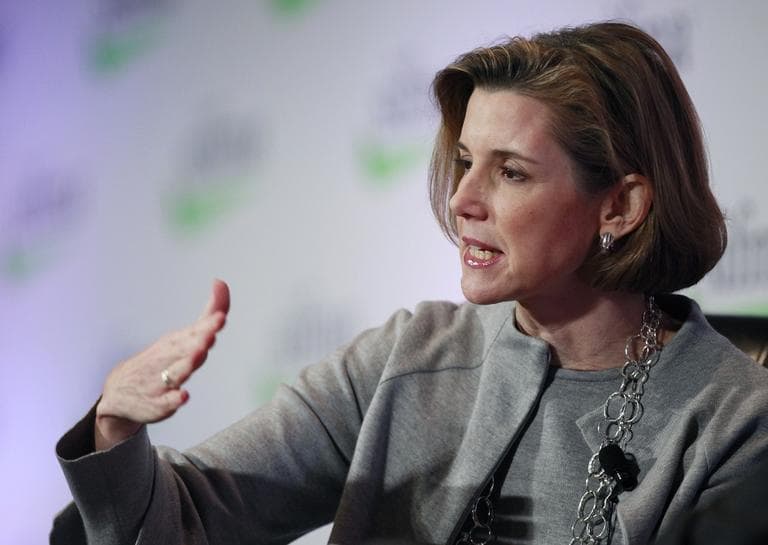Advertisement
Sallie Krawcheck: 'Bank Reform Still Needed'
Resume
Sallie Krawcheck has been at the top of Wall Street and back down, twice: She headed up global wealth and investment management for Bank of America Merill Lynch, at over two trillion dollars, the world's largest wealth management business. Before that, she held top spots including head of wealth management at Citibank.
Krawcheck was fired from both those jobs, but for many on Wall Street, she retains her sterling reputation. In 2002 Fortune put her on the cover and called her the last honest analyst on Wall Street. At Citibank, she was fired after she argued successfully that the bank return some money to investors who bought securities from the bank that turned out to be toxic.
Now she is advising business start-ups, and helping political hopefuls like Elizabeth Colbert Busch — sister of comedian Stephen Colbert — who's running for Congress in South Carolina.
And Krawcheck is calling for urgent reform of Banks, saying we should not wait until the next crisis.
Carrying Her Advocacy "Too Far"
"The opinions I'm expressing outside the banks were the opinions I expressed inside the banks," says Sallie Krawcheck.
She says banks still need different forms of compensation and types of capital.
During the early days of the recession, Krawcheck pressured her bank to refund investors.
"We had sold products to our individual investor clients that we thought were low risk, but they weren't, and they were supposed to go down a few cents in a bad market, but they went down many, many cents, almost the whole amount," says Krawcheck.
"I was fired in some ways for the right reasons."
Sallie Krawcheck
"I recommended returning the money. And there was a back and forth, back and forth, and I won that battle but I lost the job."
"I was fired in some ways for the right reasons," says Krawcheck. "If you're advocating for clients and got kicked to the curb, that's very different than you under-performed and got kicked to the curb."
Making Bank Leaders Responsible
Sallie Krawcheck says banks don't know how prepared they are for a crash until the crash happens.
"You don't really get the measure when times are good, to moderately good or to even bad. In fact you probably don't even get the measure when times are very bad. It's when they're very, very bad that you really see do the banks have enough capital," says Krawcheck.
Krawcheck says despite reform measures like the Dodd-Frank Wall Street Reform and Consumer Protection Act, she still has concerns about how much capital banks are holding in reserve.
"One of the questions is how do we know if it is enough capital? We know it was too little before, it's more now, is more enough?" Krawcheck asks.
Consumer Financial Bureau
While many on Wall Street dislike or even despise the Consumer Financial Bureau, Krawcheck supports it and thinks it's pushing the industry towards greater clarity.
"I believe having a different set of eyes focused on the individual investor and consumer is a good thing," says Krawcheck.
"We have so much attention paid to what's going on in the institutional business, so many of the regulators are looking there but to really how does this impact the consumer."
Krawcheck says a long term problem with the banking industry is how unhappy most customers are with their banks.
"[Customers] feel pretty trapped because they don't understand the interest rate they're paying or they're getting paid."
Sallie Krawcheck
"[Customers] feel pretty trapped because they don't understand the interest rate they're paying or they're getting paid," she says.
"They don't understand all the details of their mortgage product. And so you have actually fewer people leaving the banks because they feel trapped but unhappy with the bank. Long term, that is not a healthy situation."
These start ups are smaller independent banks, but also technology companies that are helping to provide more information and greater transparency to the consumer. Krawcheck points to small businesses in California and New York city — and says these are the kinds of businesses that will slowly lure customers away.
"They're all teeny tiny right now, but they will target the fact that consumers feel confused about their relationship with financial institution, and really drive a wedge in there," says Krawcheck.
Krawcheck was a key note speaker at the 2013 Simmons Leadership Conference.
- Business Insider: The Amazing Life Of Sallie Krawcheck
- Business Insider: Sallie Krawcheck: Here's What I Learned The First Time I Was Fired
- New York Times: When Citi Lost Sallie
- Harvard Business Review: 4 Ways To Fix Banks
- Fortytude Blog: Sallie Krawcheck On Being A Mom
Guest:
- Sallie Krawcheck,
This segment aired on April 4, 2013.